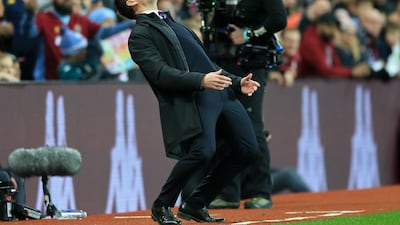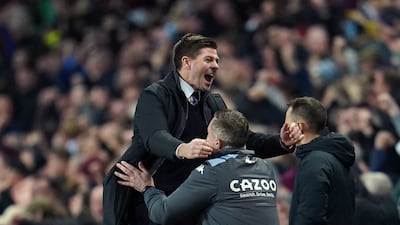As Liverpool long knew, Steven Gerrard always had the capacity to deliver late drama. If the task for Gerrard the manager is to make the same impact as Gerrard the player did, this represented a fine start. Aston Villa seemed to be grinding out a goalless draw which, after a sequence of five successive defeats, would have still represented a step forward. Instead, two goals in six minutes meant Gerrard could exit amid rapturous scenes, applauding the fans who witnessed an immediate impact.
He ran down the touchline when Ollie Watkins scored the first goal of his reign, seemed intent on doing so again when Tyrone Mings added the second, before turning to celebrate with his coaching staff. He has punched the air in glee at many a Premier League ground over the last two decades. Now he could again.
“They are the buzzes, the highs you miss as a player,” Gerrard said. “They are why you want to stay in the game. They are my medicine.” The feeling, he said, was: “A mixture of excitement and relief and pride.”
Gerrard can be framed as the architect of victory. Certainly a manager who had targeted defensive improvement got a clean sheet at the first time of asking; no mean feat, given Villa had let in 13 goals in Dean Smith’s final five games.
Emi Martinez only had two attempts to field, a snap-shot from Leandro Trossard and a drive from Tariq Lamptey. Brighton, now winless in seven, missed an opportunity to put pressure on a side short on confidence and lacking cohesion until the heady final few minutes. “I didn’t really feel under any danger until they scored,” said Brighton manager Graham Potter.
Then dreariness gave way to Villa’s delight. Gerrard had brought on his former England team-mate Ashley Young and the veteran got the first assist of the new era. “I know Ashley extremely well and he has been absolutely outstanding since we walked through the door,” said Gerrard.
Then Watkins sprinted away from the half-way line to curl in a shot. “There is no better sight in football when you see a No. 9 finish with that class and that style,” said Gerrard. Watkins had started on the left and been liberated when Gerrard took off Danny Ings, who was out of sorts and out of shape. Perhaps he merely rectified his own earlier error, but it made a difference.
Then Mings swept in a shot after Adam Webster had half-cleared John McGinn’s cross. Dropped for the last home game by Smith, the captain, who had almost scored earlier, could enjoy this rather more. As Smith could testify after his debut win with Norwich, new managers can feel transformative.
While Gerrard has a natural tendency to command the attention, he did not try to. There was nothing flashy about his entrance or his appearance. Rather, he had the air of a man who meant business. He stood alone on the edge of his technical area, often observing, sometimes interjecting. The Gerrard glare used to be directed at team-mates; now it was aimed at his charges at times.
He retained a 4-3-3 system. There was a hint of his influence in Villa’s first chance. Overlapping full-backs formed a prominent part of Gerrard’s Rangers and two combined, Matt Targett crossing for Matty Cash to draw the first save of Jason Steele’s Premier League career. Cash’s prominence suggested he may be charged with emulating James Tavernier, Gerrard’s prolific right-back for Rangers. “We have got a lot of things to build on,” Gerrard said. “In time we will become stronger and grow and get better.”








